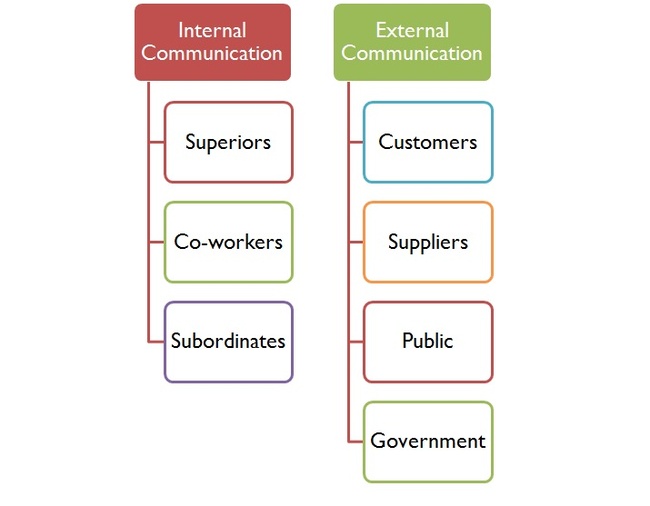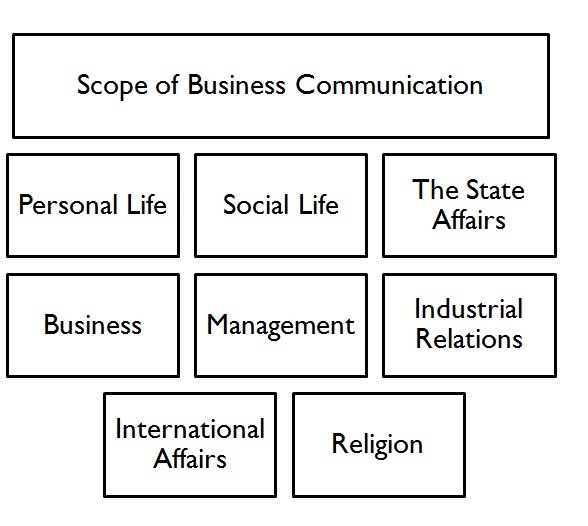Lesson 1: Fundamentals of Business Communication
Topics to be Covered (Overview):
- Introduction,
- Definition,
- Nature,
- the Communication Situation,
- Importance,
- Scope,
- Principles,
- Functions,
- Barriers, and
- Process of Business Communication
1. Introduction to Business Communication:
Communication is the giving and receiving of feedback between individuals and/or groups for the purpose of exchanging information.
2. Definition of Business Communication
1.Business
communication is the giving and receiving of feedback between individuals
and/or groups for the purpose of exchanging information and altering or
enhancing performance.
2.The process by which information and feelings are shared by people through an exchange of verbal and non-verbal messages. The successful transmission of information through a common system of symbols, signs, behavior, speech, writing or signals. The creation of shared understanding through interaction among two or more agents.
Communication
is the process of exchanging information, usually through a common system of
symbols. It takes a wide variety of forms – from two people having a face to
face conversation to hand signals to messages sent over the global
telecommunication networks. Common forms of communication include speaking,
writing, gesturing and broadcasting. Therefore, communication means to inform,
tell, show, or spread information. When a person communicates, he/ She
establishes a common ground of understanding. In the organizational context, it
brings about a unity of purpose, interest and effort.
3. Nature of Business Communication
| It is a process It is inevitable Meaning based Communication can be intentional and unintentional Communication is systematic A two-way traffic Communication is a social process A Dynamic process |
Communication
involved interaction and transaction Needs proper understanding Leads achievement of the organizational objectives Dispels misunderstandings Has Four skills A Continuous process ◦Reading, writing, speaking and listening It is the lifeblood of the business. |
4. The Communication Situation
- Memorandum
- Notice
- Telegram
- Telex
- Circular
- Minutes
- Letters
- Emails
- Telephone/Mobile/Cellular phone Calls
5. Importance of Business Communication
The importance of communication to an organization is critical to the-success of any organization and has a very significant impact on the ultimate effectiveness of the whole organization. Business Communication is a means by which behavior is modified, change is effected, information is made productive and goals are achieved.
Business communication can be internal when it is directed to persons within the organization such as superiors, co-workers or subordinates. Business communication can be external when directed to customers, suppliers, government, public, etc.
Rapid technological advancements deeply affect not only the methods of work but also the composition of groups. In such a situation, proper communication between superiors and subordinates becomes very necessary.

INTERNAL COMMUNICATION
Effective internal communication works towards establishing and disseminating of the goals of an enterprise, evolving plans for their achievement, organizing human and other resources in an efficient way.
It helps in selecting, developing and appraising members
of the organization, in motivating and encouraging people to put in their best,
and in controlling their performance.
Growth in the size and multiple locations of organizations require keeping in touch with employees spread over different states of a country or over different countries. Sending directions and getting feedback from them would be possible only through effective communication.
EXTERNAL COMMUNICATION
External communication relates an organization to the environment outside. No enterprise can thrive in a vacuum. It has to be aware of the needs of the customers, the availability of suppliers, regulations of the government and the concerns of a community. Only through effective communication can an organization become an open system interacting with its environment.
6. Scope of Business Communication
The normal functioning area of this subject. Since communication is essential in every sphere of human life, its scope is wide and pervasive. No human being or any business concern can survive without communicating.
Communication in business: Today, we cannot think of business without communication. Communication is the lifeblood of business as it provides necessary information in formulating business plans and policies. It also ensures effective performance of business activities like production, distribution, finance, warehousing etc. Thus; ultimate success of the business depends on successful communication.
Communication in management: Management is the means of achieving organizational goals. Efficiency and effectiveness of management depend on effective communication with the various internal and external parties. Every function of management depends on communication. In fact, without information; plans cannot be formulated, activities cannot be organized, directives cannot be issued and control cannot be ensured.
Communication in religion: Communication is also present in preaching and circulating various religious doctrines. Religious thinkers perform the duty of preaching through tested skills of communication.

Communication in personal life: Communication is closely related with every sphere of human life. From dawn to dusk, a person communicates with others. This reveals that communication is the part and parcel of human life.
Communication in social life: Human civilization lives in an integrated society. In social life, people need to develop social bondage. Communication helps us in creating and strengthening this social bondage.
Communication in the state affairs: Communication also pervades all areas of state affairs. Without it, state neither can administer its various wings nor can maintain relationships with the other part of the world. Due to revolutionary change in communication technologies, the whole world has turned into a global village.
Communication in industrial relations: communication is essential in labor management relationship in the industry or in an organization. Congenial industrial relation is a precondition for business success. On the other hand, free and fair communication is a pre-requisite for creating good industrial relation. Free flow of information lessens doubt, confusion and controversies between workers and management. As a result, harmonious relationship develops in the organization.
Communication in international affairs: In this age of globalization, communication is not merely confined within the national boundary. Countries are exchanging their cultural, economical, social, political, educational and technological affairs with each other continuously. In order to facilitate cooperation and communication among countries, various regional and international bodies namely the United Nations, World Bank, NAFTA, SAFTA, ASEAN, SAARC, EU etc. have been formed. Through these bodies, counties communicate various bilateral and multilateral issues among them.
7. Principles of Business Communication
- Using Tone to Build Goodwill
- Be respectful not demanding
- Be modest not arrogant
- Be polite not sarcastic
- Be positive and tactful, not negative and condensing
- Managing Your Mail/E-mail Content
- Reducing Overload/Cutting down Unnecessary Information
- Instant Messaging Privacy and Security
- Restrict contact lists on professional IM accounts to business associates to avoid inadvertently sending a personal message to an associate.
- Be alert as of possible virus infections and security risks with messages, attachments, and contact lists.
- Save significant IM exchanges (or logs) for your future reference if the software does not do so automatically.
8. Functions of Business Communication
Information refers to the role of communication in facilitating decision making and problem solving. Control: In the organizational context,
◦Control refers to the power to influence people’s behavior.
◦Motivation refers to the fostering of motivational spirit among the employees.
◦Emotional Expression relates to the function of communication in expressing or letting out the feelings and emotions of employees under various circumstances.
9. Barriers of Business Communication
If the sender’s message does not reach the receiver as it is meant to, then there must be some barrier or hindrance. What can it be? And how to avoid such barriers?
Good organizers of communication need to anticipate the barriers and remove them. The barriers range from a poor microphone to an emotional attitude that rejects the message before it is received.
For convenience of analysis, we may classify the barriers into five types:
◦Mechanical barriers
◦Physical barriers
◦Psychological barriers
◦Semantic and language barriers
◦Status barriers